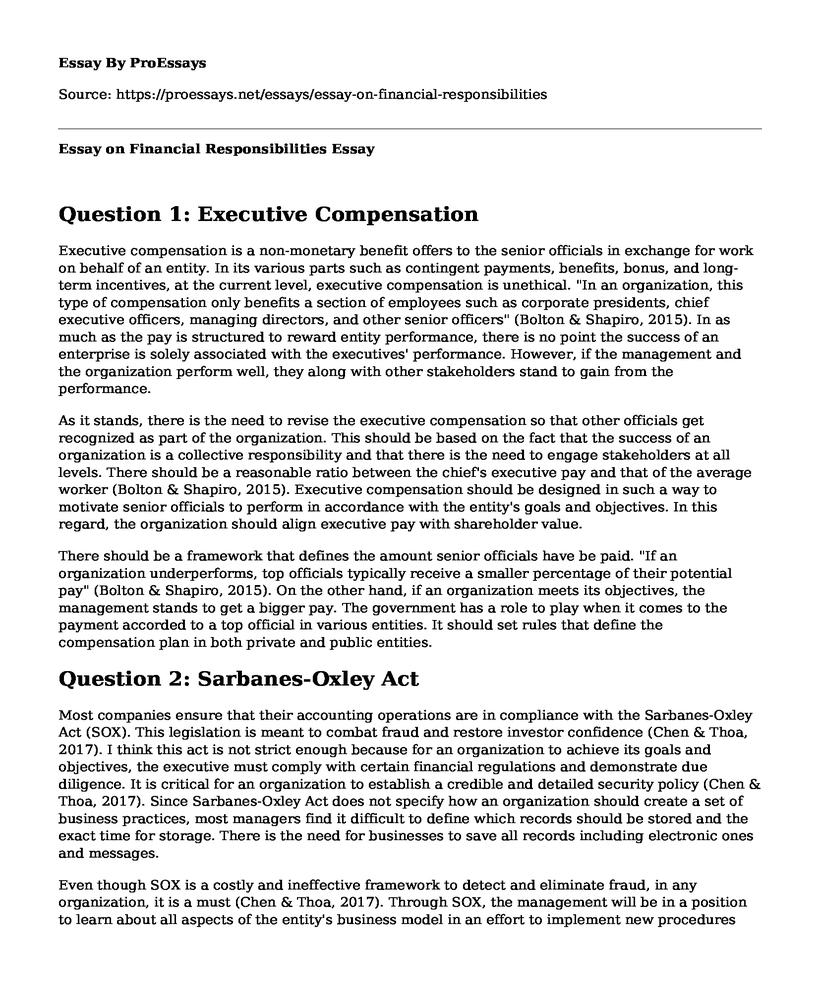Question 1: Executive Compensation
Executive compensation is a non-monetary benefit offers to the senior officials in exchange for work on behalf of an entity. In its various parts such as contingent payments, benefits, bonus, and long-term incentives, at the current level, executive compensation is unethical. "In an organization, this type of compensation only benefits a section of employees such as corporate presidents, chief executive officers, managing directors, and other senior officers" (Bolton & Shapiro, 2015). In as much as the pay is structured to reward entity performance, there is no point the success of an enterprise is solely associated with the executives' performance. However, if the management and the organization perform well, they along with other stakeholders stand to gain from the performance.
As it stands, there is the need to revise the executive compensation so that other officials get recognized as part of the organization. This should be based on the fact that the success of an organization is a collective responsibility and that there is the need to engage stakeholders at all levels. There should be a reasonable ratio between the chief's executive pay and that of the average worker (Bolton & Shapiro, 2015). Executive compensation should be designed in such a way to motivate senior officials to perform in accordance with the entity's goals and objectives. In this regard, the organization should align executive pay with shareholder value.
There should be a framework that defines the amount senior officials have be paid. "If an organization underperforms, top officials typically receive a smaller percentage of their potential pay" (Bolton & Shapiro, 2015). On the other hand, if an organization meets its objectives, the management stands to get a bigger pay. The government has a role to play when it comes to the payment accorded to a top official in various entities. It should set rules that define the compensation plan in both private and public entities.
Question 2: Sarbanes-Oxley Act
Most companies ensure that their accounting operations are in compliance with the Sarbanes-Oxley Act (SOX). This legislation is meant to combat fraud and restore investor confidence (Chen & Thoa, 2017). I think this act is not strict enough because for an organization to achieve its goals and objectives, the executive must comply with certain financial regulations and demonstrate due diligence. It is critical for an organization to establish a credible and detailed security policy (Chen & Thoa, 2017). Since Sarbanes-Oxley Act does not specify how an organization should create a set of business practices, most managers find it difficult to define which records should be stored and the exact time for storage. There is the need for businesses to save all records including electronic ones and messages.
Even though SOX is a costly and ineffective framework to detect and eliminate fraud, in any organization, it is a must (Chen & Thoa, 2017). Through SOX, the management will be in a position to learn about all aspects of the entity's business model in an effort to implement new procedures that to a greater extent provide lasting value to the company. The act is just right because it establishes safeguards to create timelines and at the same time, creates verifiable controls to track data access (Chen & Thoa, 2017). Typically, there is the need to ensure that the data collected reflects the company's projections. Also, the management should focus on critical controls that prevent and detect errors. The test controls should be procedural and relevant.
References
Bolton, P., Mehran, H., & Shapiro, J. (2015). Executive Compensation and Risk Taking. Review of Finance, 19(6), 2139-2181.
Chen, I. J., & Thoa, N. H. (2017). Board Power and Corporate Innovation: Evidence from the Sarbanes-Oxley Act (Sox).
Cite this page
Essay on Financial Responsibilities. (2022, Jul 25). Retrieved from https://proessays.net/essays/essay-on-financial-responsibilities
If you are the original author of this essay and no longer wish to have it published on the ProEssays website, please click below to request its removal:
- Taxation Cases Description
- Accounting Essay Sample
- Paper Example on Taxation in Australia
- Business Planning and the Budget Paper Example
- Essay Sample on Comprehensive Annual Financial Report
- Investment Activities: Safety, Returns & Risk of Loss - Research Paper
- Essay Example on Farmers: Tax Exemptions Under Tax Cuts and Job Act







